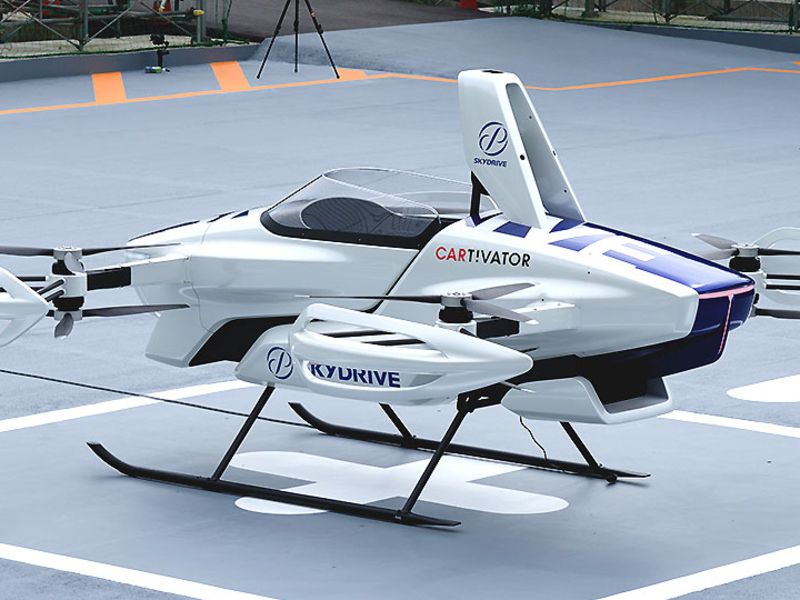
TOKYO — Toyota Motor Corp. is ready for takeoff in the brand-new world of electric air mobility.
But for now, it is skipping further investment in a Japanese startup founded partly by its own engineers in favor of an American aerospace company focused on fast, quiet flying machines.
The Japanese startup, an initiative now operating under the name SkyDrive, received ¥42.5 million ($387,700) of seed money from Toyota over a three-year period that ended in 2020.
Meanwhile, in January of that year, Toyota announced a $394 million investment into the U.S. rival, Joby Aviation, which develops electrical vertical take-off and landing aircraft, or eVTOL.
The investments highlight Toyota’s evolving approach to the wild world of venture capital.
In SkyDrive’s case, the funding was pitched as a helping hand for young, enthusiastic engineers. “It has nothing to do with Toyota’s business,” Toyota spokeswoman Shiori Hashimoto said.
For Joby, the outlay is a serious bet on a future technology trend.
“Emerging eVTOL aircraft technologies have much in common with those of next-generation environment-friendly automobiles in areas like electrification, new materials and connected technologies,” the Toyota spokeswoman said. “Toyota believes that eVTOL has the potential to evolve as a new type of mobility that has real synergies with the automobile business.”
Joby, which has also secured the backing of other giants such as Uber Technologies, went public in August, selling investors on its vision for launching a fleet of air taxis by 2024. Its aircraft more closely resembles a multi-rotor helicopter than a “flying car,” as such craft are often called.
SkyDrive CEO Tomohiro Fukuzawa says his company ranks No. 3 on the global stage in this nascent industry and acknowledges Joby as the world leader. But he says there is plenty of room for multiple players and wants SkyDrive to be Japan’s homegrown air mobility champion.
“More than 10 companies said they would launch in 2020, but nobody has started yet,” he said at a Sept. 22 news conference at the Foreign Correspondents’ Club of Japan. “Not only one maker wins it all. Just like in automobiles or motorbikes, there might be many.”
The SkyDrive team — which has its testing facility in the mountains of Toyota City — wants to start a commercial service in Osaka at the World Expo 2025.
The company got its start in 2012 as Cartivator, an enterprise founded by a group of volunteers that included Toyota employees. In 2018, the team founded SkyDrive as its commercial arm. To date, it has $48 million in funding; the biggest investor is the Development Bank of Japan.
SkyDrive’s craft, the SD-03, looks like a one-seat open-top sleigh or snowmobile with four rotor arms sticking out like oars. SkyDrive calls it the world’s smallest air mobility vehicle; its size makes it more affordable and compact enough to land on rooftops in crowded Asian cities.
The SD-03 has a footprint similar in area to that of two automobiles.
SkyDrive is planning a two-seat aircraft for the 2025 launch. Further down the road, Fukuzawa said the company will consider adding wheels so that it can run on public roads. SkyDrive also has a cargo drone called SkyLift to carry loads of 30 kilograms (66 pounds). All the craft are electric, fly autonomously and have vertical liftoff and landing ability.
What they don’t have is aircraft certification from the Japanese government.
Still, Japan’s government has been working with various companies — including Subaru, Uber and Boeing — to promote the commercialization of flying vehicles in the 2020s. The country’s powerful Ministry of Economy, Trade and Industry launched the campaign in 2018. The push came amid Japan’s concern that its auto, aerospace and technology industries were caught flat-footed in other emerging global technology trends such as autonomous driving and ride-hailing.
For its part, Toyota’s backing of Joby is part of its investment through a venture capital fund called Toyota Ventures. By this June, the fund had more than $500 million under its management.

